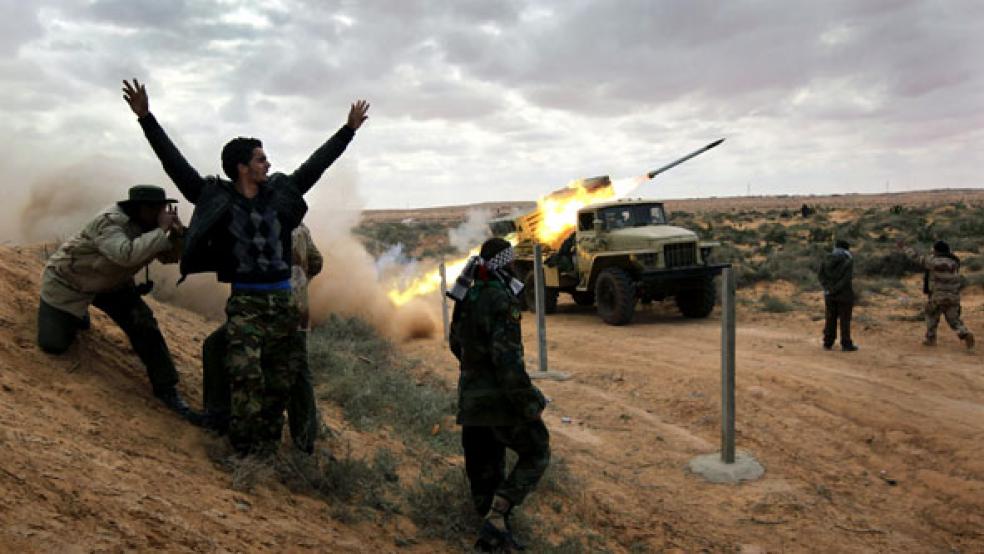Senior military commanders stressed on Monday uncertainty over the outcome and duration of the U.S.’s air and sea strikes on Libyan leader Muammer al-Qaddafi’s loyalists. However, the price tag continues to grow with each strike, hastening calls from Congress to pass off operational control to allied forces.
Gen. Carter Ham, the U.S. commander in Africa, said coalition jets fired 12 more cruise missiles over the last 24 hours at Libyan missile, command and air defense sites, following a weekend of similar attacks aimed at preventing Qaddafi’s forces from killing civilian rebel forces seeking his ouster.
The operation could cost the U.S. between $500 million and $1 billion to enforce a full no-fly zone in Libya according to a new report by the Center for Strategic and Budgetary Assessments. The CSBA used budgetary data from the wars in Afghanistan and Iraq to calculate the costs which run 20 percent less for a more limited no fly zone operation. But Maj. Chris Perrine at the Defense Department told The Fiscal Times that it is a stretch to try and take a template from one war and apply it to another.
“Each situation is different and as we’ve been saying our role was to take the lead in the first few days, then transition to a coalition lead,” Perrine said. He added that while operations for protecting citizens from attack were clearly happening in certain areas of Libya “nobody has come to say the policy is a ‘limited no-fly zone.’” So far, Operation Odyssey Dawn seems squarely focused on targeting Tripoli and other areas along the coast.
The highest costs come from munitions, fuel, and combat pay for deployed troops. The longer the military engagement, the higher the costs will be. But nobody is saying how long it will take for U.S. forces to pass military operations off to coalition forces, other than they hope it would just be a few days. Ham said in a news briefing on Monday he remains ready to begin that process, but there’s still no word if Obama’s timeline of doing so within a few days of the first wave of attacks would actually come to fruition.
These costs come at a time when Congress remains deeply divided over spending for the remainder of the fiscal year, and continues to operate under a temporary stopgap continuing resolution that goes through April 8th. Defense officials argue continuing to operate under the stopgap measure would amount to a $23 billion cut to the military’s $708.3 billion request for the fiscal year that starts October 1.
Meanwhile, Rep. Dennis Kucinich, D-Ohio, said on MSNBC today that the military strikes ordered by President Obama amounted to an impeachable offense because the president didn’t consult Congress before engaging in military operations abroad.
Even if U.S. and coalition forces successfully push back Qaddafi’s forces, there’s been no call from U.S. leaders to remove the embattled Libyan president from power. There is no U.S. military presence on the ground in Libya, senior U.S. military commanders say.
“The bad thing is what is your objective and when do you know if you’ve won,” said Lawrence J. Korb, former assistant secretary of defense under President Ronald Reagan. That (uncertainty) is what happened in Iraq, and it lasted for a decade.” He added, “It’s not just a no-fly zone. People keep calling it a no-fly zone, but it’s really an air and naval war.”
Adm. Mike Mullen, chairman of the Joints Chiefs of Staff, said on CBS’s “Face the Nation” on Sunday that “there have been lots of options which have been discussed, but I think it’s very uncertain how this ends.” Mullen also acknowledged that one of the outcomes could be that Qaddafi remains in power.
Related Links:
Costs of Libya Operation Already Piling Up (National Journal)
General: Coalition Strikes More Gadhafi Defenses (ABC News)
Libya no-fly zone to soon reach 1,000km – general (Reuters)




